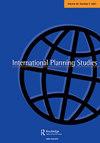圣保罗以交通为导向的发展:空间分析显示取得了进步,但社会包容性不足
IF 1.5
Q4 REGIONAL & URBAN PLANNING
引用次数: 0
摘要
摘要当代大城市需要复杂的解决方案,根据证据数据整合不同的公共政策并将其属地化。在圣保罗,自上一次城市总体规划(2014年)以来,以交通为导向的发展(TOD)一直被用作一种综合城市和交通规划工具,以促进城市更可持续、更具包容性的发展,该规划在房地产行业的抵制下获得批准。经过近十年的实施,空间研究揭示了令人满意的城市密度,这些地区建造的房地产项目数量显著增加,住房单元规模减少。然而,由于房地产价格上涨,低收入家庭没有充分纳入TOD区域的增长。我们认为,在圣保罗等社会不平等程度较高的城市,应根据具体的社会空间和法律背景调整TOD指导方针,以促进更具包容性和可持续的发展。本文章由计算机程序翻译,如有差异,请以英文原文为准。
Transit Oriented Development (TOD) in São Paulo: spatial analysis shows advances, but not sufficient social inclusion
ABSTRACT Large contemporary cities demand complex solutions that integrate and territorialize different public policies based on evidence data. In São Paulo, Transit Oriented Development (TOD) has been used as an integrated urban and transport planning tool to promote a more sustainable and inclusive development of the city since the last City Master Plan (2014), approved after much resistance from the sector real estate. After almost a decade of implementation, spatial research reveals a desirable urban density, with a significant increase in the number of real estate projects built and a reduction in the size of housing units in these areas. However, low-income households have not been sufficiently included in the growth of TOD areas due to rising property prices. We argue that in cities with high social inequality, such as São Paulo, TOD guidelines should be adjusted based on specific socio-spatial and legal contexts to promote more inclusive and sustainable development.
求助全文
通过发布文献求助,成功后即可免费获取论文全文。
去求助
来源期刊

International Planning Studies
REGIONAL & URBAN PLANNING-
CiteScore
4.60
自引率
4.80%
发文量
20
期刊介绍:
Planning, at urban, regional, national and international levels, faces new challenges, notably those related to the growth of globalisation as both an objective socio-economic process and a shift in policy-maker perceptions and modes of analysis. International Planning Studies (IPS) addresses these issues by publishing quality research in a variety of specific fields and from a range of theoretical and normative perspectives, which helps improve understanding of the actual and potential role of planning and planners in this context.
 求助内容:
求助内容: 应助结果提醒方式:
应助结果提醒方式:


